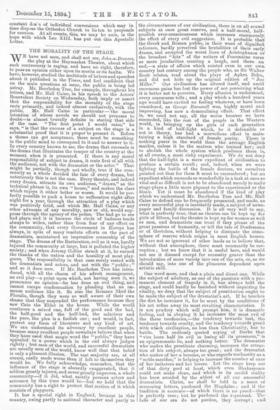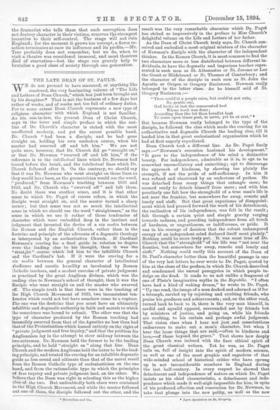THE MORALITY OF THE STAGE.
WE have not seen, and shall not see, John-a-Dreams, the play at the Haymarket Theatre, about which such controversy is raging, and have no right, therefore, to pass an opinion either upon its merits or its faults. We have, however, studied the multitude of letters and speeches about it published in the Times, and feel confident that on the main questions at issue, the public is being led astray. Mr. Beerbohm Tree, for example, throughout his letters, and Mr. Hall Caine, in his speech to the Actors' Benevolent Society on Wednesday, both imply or assert that the responsibility for the morality of the stage rests primarily, and indeed almost exclusively, with the public. Mr. Hall Caine in particular—. the moral intention of whose novels we should not presume to doubt—is almost brutally definite in stating that aide of the ease. "The first point I would raise," he says, "is that the success of a subject on the stage is a substantial proof that it is proper to present it. Before a theme can get acceptance, there must be something in the public mind to correspond to it and to answer to it. In every country known to me, the drama that succeeds is the drama that illustrates the temper of the country at the moment when it is presented. If there is any moral responsibility of subject in drama, it rests first of all with the audience, not with the dramatist or the actor." That might be partially, though not wholly, true if the com- munity as a. whole decided the fate of every drama, but notoriously this is not the case. Every theatre, and indeed every drama, attracts its own audience, "draws," as the technical phrase is, its own "house," and makes the class which enjoys it either better or worse. It would be per- fectly possible to pack a house to suffocation night after night for a, year, through the attraction of a play which was positively fetid, and which Mr. Hall Caine, or any other advocate of any morality, new or old, would sup- press through the agency of the police. The bad go to see bad plays, and it is because the circle of badness tends always to widen, rather than from fear of any effect on the community, that every Government in Europe has always, in spite of many resolute efforts on the part of dramatists, maintained an imperative censorship of the stage. The drama of the Restoration, evil as it was, hardly injured the community at large, but it polluted the higher society ; and when Jeremy Collier struck at it, he earned the thanks of the nation and the hostility of most play- goers. The responsibility in that case surely rested with the dramatists and actors, and not with the " public ; " and so it does now. If Mr. Beerbohm Tree has intro- duced, with all the charm of his adroit management, an evil play—a point upon which, not having seen it, we pronounce no opinion—he has done an evil thing, and cannot escape condemnation by pleading that an im- mense audience like it. So also the Romans liked the Floralia, though they were so well aware of their own shame that they suspended the performance because they saw Cato the Elder in the house. While the world continues a mixed one, full of the good and the bad, the half-good and the half-bad, the salacious and the pure, the plea is a foolish one ; and would, in fact, protect any form of literature and any kind of art. We can understand its advocacy by excellent people, because many excellent people nowadays believe that when they have used that magic word the "public," they have appealed to a power which in the end always judges rightly ; but men of the world, and successful dramatists are usually men of the world, know well that that belief is only a pleasant illusion. The vast majority are, at all events, easily made worse than if left to themselves they would be. We fully acknowledge, remember, that the influence of the stage is absurdly exaggerated, that it seldom greatly injures, and never greatly improves, a whole community—if it did, what saintly persons actors and actresses by this time would be—but we hold that the community has a right to protect that section of it which consists of playgoers. It has a special right in England, because in this country, owing partly to national character and partly to the circumstances of our civilisation, there is on all sexua3 subjects at once great reserve, and a half-moral, half. prudish over-consciousness which increases enormously', the effect of every evil suggestion. It is probable that the Greek and Roman public, in their want of dignifiedt reticence, hardly perceived the brutalities of their early; drama, and accepted the worst lines of Aristophanes os the broadest "hits" of the writers of Fescennine verso as mere jocularities creating a laugh, and there an end,—a state of affairs which existed even in our own, country last century among the people who, as Sir Walter Scott relates, read aloud the plays of Aphra Behn, and did not hide up the original edition of "Joe. Miller." Our civilisation has altered itself, and amid enormous gains has lost the power of not perceiving what it is better not to perceive. Every allusion is understood; every coarseness tells ; and a play which a hundred years ago would have excited no feeling whatever, or have been considered, as George Barnwell was, highly moral and improving, has now a demoralising effect. That effect is, we need not say, all the worse because we have succeeded, like the rest of the people in the Western world, in bringing up the girls of each generation in a kind of half-light which, be it defensible or not in theory, has had a marvellous effect in main,. taming a high standard of female purity. There is nothing purer in the world than the average English maiden, unless it be the matron who trained her ; and to abolish the whole system which produces them is, at all events, a most risky experiment. We do not deny that the half-light is a mere expedient of civilisation to produce a certain result ; and, indeed, when we were fighting the battle of the female doctors, we ourselves pointed out that for them t must be surrendered ; but an expedient which succeeds so wonderfully in a task at once so vital and so difficult is not to be abandoned merely to make stage-plays a little more piquant to the experienced or the biases. Yet it must be abandoned if the kind of play which we understand Mr. Beerbohm Tree and Mr. Hall Caine to defend can be frequently presented, and made, as every successful play is inevitably made a subject of news- paper and family discussion. It is all very well to say, what is perfectly true, that no theatre can be kept up for girls of fifteen, but the theatre is kept up for women as well as nien, and dramatists can treat if they please of the great passions of humanity, or tell the tale of Desdemona or of Gretchen, without helping to dissipate the atmo- sphere of reserve which reigns in most English homes. We are not so ignorant of other lands as to believe that without that atmosphere, there must necessarily be cor, ruption ; but we know that it is useful here, and would not see it disused except for necessity graver than the introduction of more variety into one of the arts, or, as we should say., into one of the pleasures dependent upon artistic skill.
One word more, and that a plain and direct one. While the subject of adultery, as one of the passions with a pee- manent element of tragedy in it, has always held the stage, and could hardly be banished without impairing its vitality, we deny that the subject of prostitution ought to be made the subject of the dramatist's art. If he touches the dirt he increases it, for he must by the conditions of his art refine away its most revolting characteristics. It is not prudery which will prompt him, it is dramatic feeling, and in obeying it he increases the most evil of the three tendencies —the tendency towards lust, the tendency towards cruelty, and the tendency towards greed with which civilisation, no less than Christianity, has to battle. The endlessly quoted saying of Burke that "vice loses half its evil in losing all its grossness," is an epigrammatic lie, and nothing better. The dramatist who makes the prostitute charming, increases the attrac- tion of his subject, always too great ; and the dramatist who makes of her a heroine, or who regards unchastity as a "noble sacrifice," is helping to increase the number at once of her imitators and her lovers. Let the stage keep out of that dirty pool at least, which even Shakespeare could not make clean, and which in its sordid reality has been avoided by the ablest of all our successful dramatists. Christ, we shall be told in a score of screaming letters, pardoned the Magdalen ; and if the tradition is accurate—of which there is no proof—that is perfectly true ; but he pardoned the repentant. The lads of our era do not pardon, they corrupt ; Etna
the dramatist who tells them that such corruption does not destroy character in their victims, removes the strongest incentive to their self-control. The stage will not ruin England ; for the moment it grows too corrupt, a fierce re- action terminates at once its influence and its profits.—Mr. Tree probably does not remember, but we do, when to visit a theatre was considered immoral, and most theatres died of starvation—but the stage can gravely help to brutalise a good class of society through one generation.









































 Previous page
Previous page